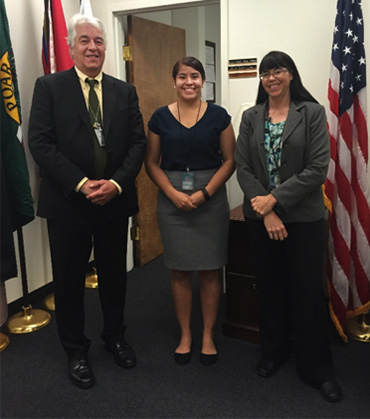Meet a Fellow: JoRee LaFrance
Undergraduate student promotes her culture and clean energy advancement
As the U.S. Department of Energy (DOE) searches for methods to reduce the nation’s carbon dioxide emissions, it recognizes the potential for collaboration with native tribes who are generally devoted to environmental stewardship. However, in order to work together effectively, proper communication and education becomes necessary.
As a participant in the Mickey Leland Energy Fellowship (MLEF) Program, JoRee LaFrance, a Native American student, dedicated her summer to promoting clean energy and partnerships between the U.S. government and her community.

Mickey Leland Energy Fellow (MLEF), JoRee LaFrance (middle), dedicated her summer to identifying opportunities for tribal collaboration regarding the advancement of clean energy.
“I chose a STEM career because native people are the most underrepresented group in the field of science,” LaFrance said. “So, to be a Native American and a woman in the field is motivation for me every day.”
Alongside her mentor, Ann Satsangi, in the DOE’s Office of Clean Coal and Carbon Management, LaFrance identified opportunities for tribal collaboration in Carbon Capture and Storage (CCS), a process that involves trapping carbon dioxide and storing it to prevent its release into the atmosphere. She explored a case study of a potential CCS deployment research and development project with the Crow Nation. This involved creating a trial outreach strategy, and initiating and strengthening the partnership between the DOE’s Office of Clean Coal and Carbon Management and the Office of Indian Energy Policy and Programs.
“The purpose of my research project was to explore potential advanced coal technology and CCS opportunities for tribes,” LaFrance explained. “People often forget that reservations sit on rich natural resources, and some tribes choose to tap into those reservoirs as a means of financial revenue and employment opportunities.”
During her participation in the program, LaFrance had the opportunity to travel to Spokane, Washington, to attend the 2016 National Congress of American Indians mid-year conference. Interacting with tribal leaders and DOE staff was the highlight of her summer. Ultimately, she envisions herself returning to DOE and continuing to advocate for and act on behalf of native tribes.
“My hope is that we will create a cleaner, greener world for ourselves and future generations by taking small steps today,” LaFrance said.
After she completes her bachelor’s degrees in earth sciences and Native American studies at Dartmouth College, LaFrance plans to pursue master’s degrees in hydrogeology and public policy with an emphasis in federal Indian law.
“After participating in the program, I know that I want to go into public policy because it will allow me to create positive change in Indian country. I hope to advance native nations across North America in sovereignty and sustainability,” LaFrance said. “To have an opportunity at DOE paved a road for opportunities and connections that will benefit my career in the future.”
The MLEF Program is administered by the Oak Ridge Institute for Science and Education (ORISE) for the U.S. Department of Energy.